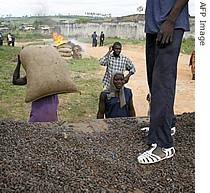2007年VOA标准英语-Report Says Misuse of Ivory Coast Cocoa Revenue(在线收听)
Dakar
08 June 2007
A new report by the London-based watchdog group Global Witness says cocoa exports have helped fund the conflict in divided Ivory Coast, both for the government-run army and northern-based rebels. The world's leading cocoa producer remains split in two, despite peace efforts, that have repeatedly stalled. Selah Hennessy reports from the VOA West Africa bureau in Dakar.
 |
| Ivorian farmers unload sacks of cocoa beans for burning at Anyama, north of Abidjan, Oct 2006 |
Global Witness says that in the same way that so-called "blood diamonds" have adversely affected the lives of people in Sierra Leone and Liberia, and oil has fueled violence in the Niger Delta, so cocoa has done the same in Ivory Coast.
The report says that the misuse of cocoa revenue in Ivory Coast is now slowing down the country's peace process.
Alioune Tine, a West African human rights activist, says this report for the first time clearly demonstrates how the cocoa sector has been used to fuel conflict.
"We have [with this report] how these resources are used to buy arms and aggravate the conflict in Ivory Coast," said Tine.
He says it has long been known that Ivory Coast's cocoa industry is also marred by mismanagement.
"It is the problem of bad governance, problem of transparency, problem of corruption," he said.
Maria Lopez from Global Witness called for urgent reforms, as the latest peace deal is slowly taking hold.
"We believe that at this really transitional, key point of the situation in Ivory Coast, it is time for transparency in the cocoa sector and it is time to set the right foundation for a good future, for development to strive in Ivory Coast," said Lopez.
The report stops short of calling for an embargo.
"We are not asking for an embargo or, for say a boycott for Ivorian cocoa. What we are asking companies [is] just to play a positive role and say clearly how much they are paying the cocoa institutions, that would be the right step towards more transparency in the cocoa sector," said Lopez.
Michel Saraka who works with the non-profit foundation Open Society Initiative for West Africa says it is the cocoa farmers and Ivorian citizens who are the main victims.
"If citizens don't know how the sector is managed, they cannot really demand accountability," said Saraka.
Rebels and government officials did not immediately respond to charges made in the new report.
President Laurent Gbagbo has repeatedly denied there is any illicit use of cocoa funds. He has also been accused by Ivorian media of using cocoa funds to sponsor the so-called Young Patriots, who have repeatedly marched and rioted in main southern cities when they believed the international community was curtailing presidential power.
Cocoa exporting companies have said they have no control over how Ivorians spend cocoa revenue. They also say tracing the origin of cocoa, as is now done for diamonds to eliminate so-called blood diamonds, would be impossible.
During the 1990s, cocoa companies faced charges of child labor on the many Ivorian cocoa plantations, but have since worked to reduce the problem.